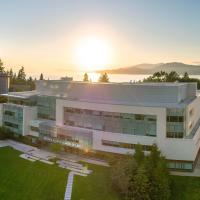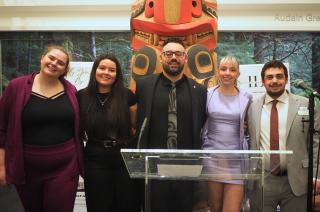Reforming Canada’s prison system: Meet grad student Mark Mancini

Allard Law
May 2, 2022

“We hear a lot about the rule of law, but the term can mean many things,” says Allard School of Law doctoral student Mark Mancini. “At its core, the term suggests that all power should have limits.”
Funded through a SSHRC Doctoral Program Award, Mark’s research looks at how we can ensure that government agencies follow the law—and how that could help prevent arbitrary exercises of power in Canada’s prison system.
In this interview, Mark shares insight into his ongoing research and how the right institutional reforms could improve the lives of prisoners.
Can you share a bit about your doctoral research project?
The rule of law connotes the idea that all power should be restrained. My project asks what it means to subject Correctional Services Canada (CSC)—the federal agency that implements correctional policy and runs Canada’s prison system—to the rule of law.
I look at the way courts should review CSC decision-making to ensure that, to the extent possible, CSC is subject to the law. I’m also focusing on the institutional reforms required in distinct areas—such as policies regarding solitary confinement and healthcare—to ensure that CSC meets its statutory and constitutional duties.
The rule of law is not just an abstract ideal. It’s a set of guidelines that could point to important institutional reforms that could improve the lives of prisoners.
The questions my work asks are challenging. Can we subject a bureaucracy like the CSC to the rule of law? What are the limits of the rule of law, especially in the context of a bureaucracy that may reject the rule of law?
In what ways do you hope your research makes an impact? What are the possible real-world applications?
For some time, courts in different contexts have held that decision-makers like wardens and the Parole Board are “experts,” and for that reason, their decisions should not generally be overturned by courts. But I question this assumption as a matter of fact and suggest it’s contrary to the constitutional principle of the rule of law. As such, my work provides suggestions for how courts should review decision-making in prisons.
I also investigate how the rule of law could provide guidelines for reforming certain aspects of CSC, specifically concerning the new “solitary confinement.” The point is that the rule of law is not just an abstract ideal. It is a set of guidelines that could point to important institutional reforms that could much improve the lives of prisoners. And for it to mean anything in a repressive context like a prison, courts must take the rule of law seriously.
What influenced you to pursue graduate studies at Allard Law?
I was particularly attracted to Allard Law because of my supervisors. Professors Debra Parkes and Mary Liston are two of the best scholars in criminal justice and administrative law, respectively. Given that my dissertation topic spans the same two broad areas of law, they are well-suited to provide the guidance I require as a younger scholar. They’re also generous with their time and eager to offer constructive suggestions, so it’s generally been a pleasure to work with them.
What strategies have you adopted to help you through graduate school?
I’m lucky to have the support of my lovely wife, Jerica, and my wiener dog, Hugo. I also think it’s important for people to have real-world hobbies, interests and devotions. I took up boxing a year ago and it’s been a great way for me to meet new people and learn new skills.
What would you say has been the highlight of your time at Allard Law and UBC so far?
So far, I’d say it’s been being back in the school and seeing colleagues. The pandemic robbed us of many things, but one was the ability to meet and discuss with colleagues in person. I’m hopeful that this important aspect of graduate education will continue throughout 2022.
Do you have any tips on work-life balance for new grad students?
I’m still figuring it out myself, but for now, I’d say that developing a life outside of work and your research is integral to finding a balance. We contain multitudes, as they say, and being a good graduate student and researcher depends, I think, on having a healthy life outside of study. This might seem obvious, but it has taken me a while to learn this.
- Allard School of Law

